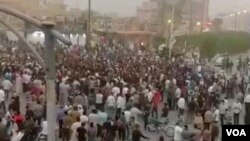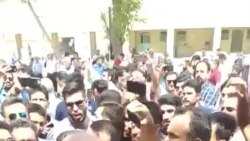Hundreds of Iranians have demonstrated against water shortages in a southwestern city, in one of the biggest water-related protests that Iran has seen so far this year.
Video clips verified by VOA Persian and sent by residents of Khorramshahr showed large crowds protesting in the streets of the inland port city Friday. Located in Iran's Khuzestan province, Khorramshahr is adjacent to the Karun River that forms the border with Iraq. The region has suffered shortages of drinkable water for months, in part due to a lack of rainfall.
Residents who spoke to VOA Persian said they also blame the shortages on perceived government mismanagement of water supplies and suspected government transfers of those supplies to Iraq and nearby Kuwait. Earlier this month, some residents broke open and filmed a pipe carrying fresh water toward the Iraqi border, a revelation that outraged many locals as the video spread on social media.
State run news agency Fars reported the Khorramshahr protest, saying about 300 people demonstrated against the rising salinity of the city's running water.
In one video clip of the protest, dozens of angry residents confronted the city's governor, Vali-olah Hayati, accusing him of incompetence and saying he should be ashamed and leave his post.
WATCH: Iranian protesters angered by water shortages confront Khorramshahr's governor, June 29, 2018
In another video, protesters, some holding up empty water bottles, chanted: "Police, catch the thieves!"
WATCH: Residents of Khorramshar, Iran, call authorities "thieves" for failing to provide adequate fresh water, in this June 29, 2018, protest
One Khorramshahr resident told VOA Persian the city's running water is so polluted that people have been unable to purify it with home purifiers.
In Friday's edition of VOA Persian's Straight Talk call-in show, a caller who identified himself as Mehran in the Khuzestan provincial city of Masjed Soleyman said he believes the transfer of fresh water to Kuwait is the main cause of the region's water crisis.
Iran signed a deal with Kuwait in 2003 to deliver 955 million liters of fresh water daily to the Arab state via a pipeline for 30 years. Tehran has not signed such an agreement with Iraq. But an Iraqi TV news report broadcast about a month ago and monitored by VOA Persian showed Iraqis in the southeastern city of Basra lining up to receive what the report said was fresh water supplied from nearby Iran.
The report included soundbites from two men who thanked Iranian Supreme Leader Ayatollah Ali Khamenei for what they called the gift of clean water.
The Fars report about Friday's protest in Khorramshahr quoted Iranian Energy Minister Reza Ardakanian as denying that Iran has been selling scare fresh water to neighboring countries.
Ardakanian also said the water shortages experienced by Khorramshahr and the nearby city of Abadan would be resolved by mid-July, when a water distribution system known as Ghadir is due to become operational.
Iranian officials have acknowledged that outdated agricultural and irrigation systems and poor water management policies in the past three decades have contributed to nationwide water shortages this year. Below-average precipitation has exacerbated the situation.
Afshar Sigarchi and Behrooz Samadbeygi for VOA's Persian Service contributed to this report. Michael Lipin reported from Washington.













